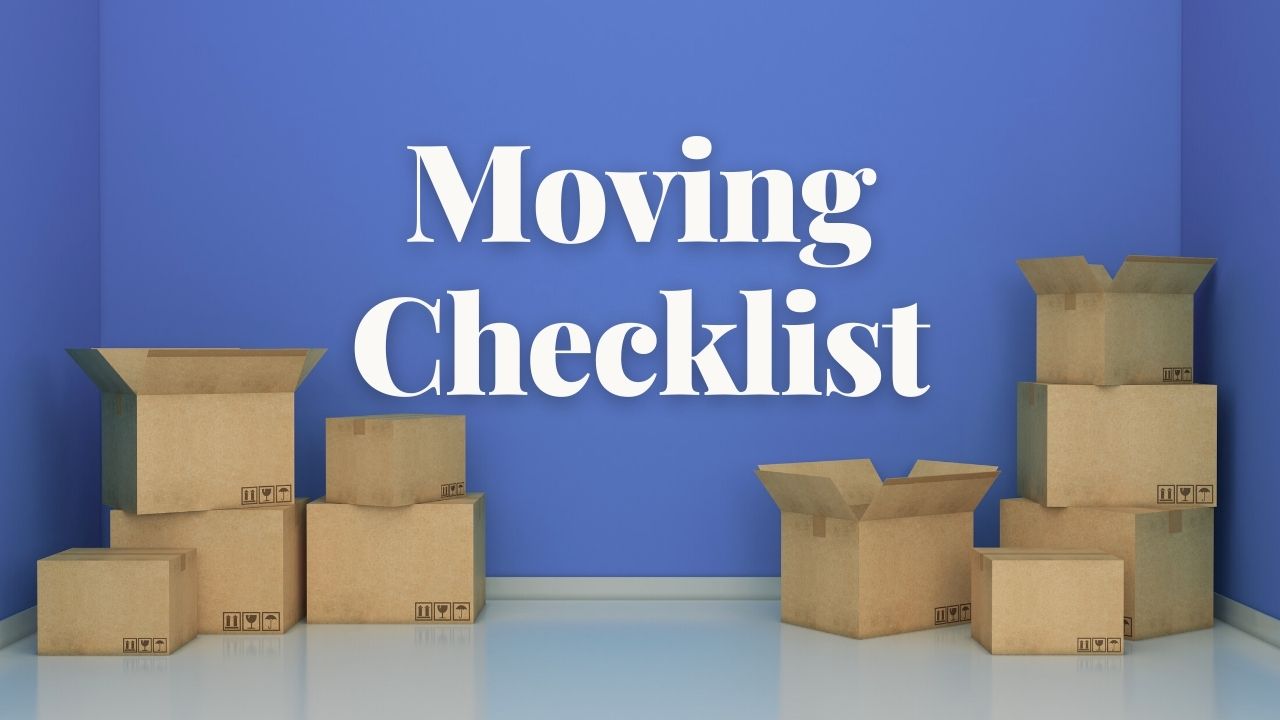Moving can be stressful, but this list will walk through what you’ll need to do in the weeks leading up to the big move.
Moving Checklist
8 Weeks Before:
- Create a “moving” file or binder to keep track of everything – estimates, receipts, inventory of items you’re moving, etc.
- Are you moving yourself or hiring a professional? Check out options and know your budget. If you decide to go with a moving company, request an on-site written estimate. Be sure to ask questions from cancellation policies to liability coverage and verify the moving company is licensed and insured. Find out as much as you can before you sign a contract. If you’re moving yourself, ask family and friends for help.
- Start sorting and purging. Go through every room of your house and decide what you’d like to keep and what you can get rid of.
- If you have school-age children and are moving to a new community, start researching schools. Organize school records and arrange for them to be transferred to the new school district.
- If you’re renting, check your lease agreement for specific details on how much notice is required or how to break it before making moving plans.
6 Weeks Before:
- Make note of all tax-deductible moving expenses. Remember household donations to charities as well as any moving expenses for a job-related relocation.
- Collect free boxes and order supplies. Remember packing tape, bubble wrap, and permanent markers. Socks, t-shirts, and towels work great as free packing supplies.
- Create an inventory sheet of all your valuables before they go on the moving truck. Keep a private list of which boxes your valuables are packed in.
- Take photos of all electronics before you unplug them. This will help when you’re trying to reconnect them.
- Measure doorways, stairways, and rooms at your new home to make sure all of your furniture will fit.
- Start packing a little every day. Begin with non-essentials and seasonal items. This could include winter coats, non-seasonal sports gear, books, and other belongings you won’t need before your move.
- Check on auto and homeowner’s insurance. Contact your current agents to see if they do business in your new location. If not, you may need to change insurance providers before you move. Update your car registration.
- Start using up refrigerated food and pantry items. You may want to consider donating non-perishables to your local food pantry.
- Host a garage sale and decide what items you can donate to organizations such as Goodwill, Salvation Army, Easter Seals, etc.
- Update memberships at any community organizations, gyms, or clubs. Many monthly memberships need at least 30 days’ notice.
4 Weeks Before:
- Gather all financial and legal records in one place. Remember birth certificates and passports. Carry all important documents on your person on moving day.
- Arrange for medical records to be sent to any new healthcare providers or obtain copies of them yourself. Ask for referrals.
- Request copies of vet records. Get any necessary pet medication. Remember ID tags for their collars.
- Call all utility service providers to let them know you’re moving. This includes gas, electric, cable, internet, satellite, security system, trash, phone, etc. If you are moving to a new community, schedule installation dates. Make sure important utilities such as electricity and gas are turned on in your new home before you move.
- Service the car. If you’re moving a long distance and using your own car to drive, check tires, fluids, and brakes.
- Notify banks, employer’s HR department, magazine and newspaper subscriptions, credit cards, brokerage firms, social security, Medicare, Department of Veteran Affairs, etc. Remember to order new checks.
- Complete a change of address at your local post office or online at usps.gov.
- Dispose of hazardous items. You won’t be able to move hazardous and flammable items and you can’t dispose of them in your regular trash. Check with your local municipality for the best way to dispose of items such as paint, aerosols, fertilizers, propane tanks, fire extinguishers, pool chemicals, etc.
2 Weeks Before:
- Confirm the moving date and time with your moving company. Let them know of any other important logistics, such as parking and/or elevator use.
- If you are moving to a new community, clean out your safe-deposit box and any lockers you might have at the gym or community center.
- Back up your computer. Better safe than sorry.
- Return borrowed items from family and friends, library books, rented movies, etc.
- Arrange for childcare on moving day. If you have babies or small children, give yourself a break and arrange for a babysitter to watch your kids on moving day.
- Request time off from work if you’re moving on a weekday.
- If necessary, schedule painters for your new home.
- Remove lightbulbs from lamps that you plan on moving.
- Prep two weeks’ worth of meals.
- Fill your prescriptions.
- Prepare a list of service technicians and preferred providers (plumbers, electricians, etc.)
- Find a safe place for your pets to go while you move.
- Help future residents by gathering the warranty information, instruction manuals and receipts for appliances and electrical devices you are leaving.
The Week you Move:
- Clean your old home. If you’re renting, a little bit of effort could save you a cleaning fee or charge against your security deposit.
- Finish last minute errands. These may include picking up dry cleaning, getting prescriptions, etc.
- Pack kitchenware and essentials.
- Pack your suitcases. Aim to finish general packing a few days before your moving date. Pack suitcases for everyone in the family with enough clothes to wear for a few days.
- Unplug your fridge and freezer to defrost the night before. Lay a towel in front to absorb any water that leaks. Don’t forget to drain water hoses to your washing machine and ice maker.
- Make arrangements for final trash removal and recycling pickup. If you’re leaving before the next pickup date, ask neighbors to place your trash can back where it belongs after it’s been picked up.
- Pack a kit with everything you’ll need for the first 24 hours in your new home. See our “First 24 Hours List”.
- Get cash for a tip. Tipping movers is a nice gesture for a job well done.
Moving Day:
- Set an alarm and get up early.
- Have water bottles on hand. Be sure to have plenty of water on-hand for friends and movers.
- Protect floors and carpets during the move.
- Do one last check before you leave your home. Remember to look in bathtubs, washers, dryers, pantry, closet corners, and any other easy-to-miss spots. Turn off the lights when you leave.
- As soon as your movers leave, make your bed and unpack your shower curtain and toiletries. This makes life so much easier.
- Make sure necessary utilities (gas and electric) are connected.
- Take inventory before the movers leave and sign the bill of lading/inventory list and keep a copy.
The move is done! Now here are a few things to remember to do within the first month in your new home.
First Month After:
- The unpacking process doesn’t have to overwhelm you. Start with your suitcase, kitchenware, bed linens, and other essentials. After you’ve unpacked these important items, go room by room until you’ve unpacked the rest of the house.
- During the first week, give your place a good, thorough cleaning including mopping, vacuuming, carpets, and dusting. Don’t want to clean? Try arranging for a professional cleaning crew to come during the first month. If you have a natural fireplace, remember to sweep your chimney before you use it.
- If you rented your first home, check with your former landlord about the status of your security deposit return. Make sure your landlord knows your new address.
- Change the locks. It is one of the best ways to keep your house safe and secure; there’s no telling who the former residents gave keys to.
- Verify trash pickup days.
- Check smoke alarms.
- Update your driver’s license and register to vote. Meet the neighbors. Don’t be afraid to ring the doorbell and say “hello”. Most people will appreciate the gesture and you may make a few new friends in the process.
- Explore your new neighborhood – local shops, supermarkets, libraries, cafes, and restaurants.
Website: LaurasRealEstateGroup.com
Office: (920) 945-0113
Email: [email protected]
Facebook: https://www.facebook.com/LaurasRealEs…
Instagram: https://www.instagram.com/laurasreale…
Tiktok: @LaurasRealEstateGroup





